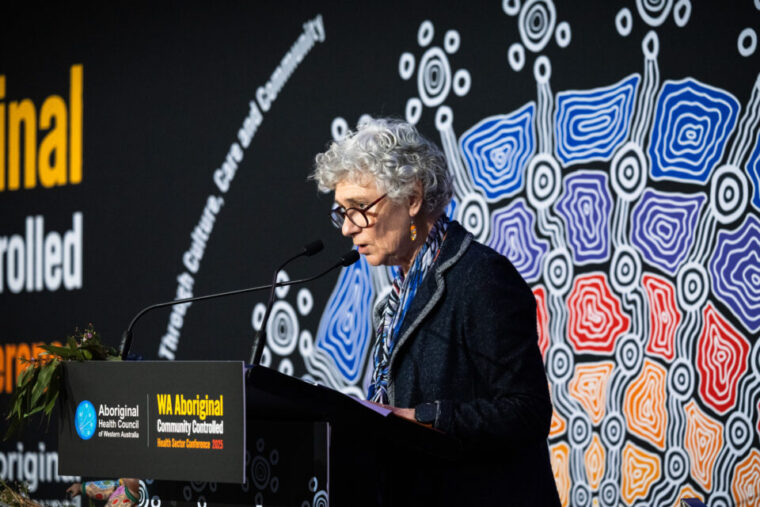A new COVID-19 Response Review produced by the State’s peak body for Aboriginal health reveals the remarkable scope and scale of Western Australia’s Aboriginal Community Controlled Health Services’ work during the pandemic—and makes vital recommendations to government to ensure preparedness for future health emergencies.
The Aboriginal Health Council of Western Australia’s 200-page Review, supported by Chief Executives from ACCHS across WA, details how ACCHS indispensably complemented the State’s response by providing culturally safe, localised and accessible alternatives (for information, vaccination, testing and treatment); and filled multiple gaps where there was no Government service available.
AHCWA’s Health Systems Advisor Dr Marianne Wood described ACCHS assistance to Government as vital to the success of the pandemic response. “They worked to develop original, culturally safe strategies to increase vaccine uptake; and created new approaches to growing workforce capacity and expand vaccine access,” Dr Wood said. “When COVID-19 swept through in WA in 2022, WA ACCHS worked together with Aboriginal communities and public health authorities to respond rapidly and intensively, supporting COVID-19 testing, providing essential support for households during mandatory isolation, offering comprehensive clinical monitoring and treatment, and maintaining a steady flow of clear and trustworthy information to communities as Government rules and recommendations changed.”
But despite the remarkable responsiveness of the ACCHS, their work throughout the pandemic was often fraught with frustration and came at a cost. The Sector had not been included in WA’s pre-pandemic planning or testing processes and had no formalised role in the outbreak response. Throughout the three-year pandemic emergency, ACCHS often struggled to be heard. The COVID-19 Response Review calls for the work and expertise of the ACCHS Sector to be fully recognised and acknowledged by Governments (at all levels); and for future pandemic planning, including system design and testing, to be done in true partnership—where ACCHS have decision-making power and access to both funding and data, in keeping with the four priority reforms of the National Agreement on Closing the Gap.
Key recommendations in the Review found the following:
Governments must ensure that authentic partnerships with Aboriginal people and organisations are established both prior to and during health emergencies. Partnerships must respect Aboriginal leadership and expertise; and decision-making must be genuinely shared. Decentralised planning and locally-led solutions must be supported.
Governments must recognise the unique skillset and expertise of the WA ACCHS, and acknowledge the indispensable, wide-ranging roles they performed during the COVID-19 pandemic. It is inevitable that the Sector will perform these roles, and others, in future health emergencies; and this work (together with the ongoing delivery of critical primary healthcare service) needs to be appropriately funded and supported, in a timely way.
Governments must ensure that the needs of Aboriginal people, families and communities (urban, regional and remote) are properly considered and addressed at all four stages of health emergency management (Prevention, Preparedness, Response and Recovery). Mainstream services during health emergencies must be culturally safe, accessible and prioritised according to need. Pandemic planning must address the social determinants of health—particularly housing.
Governments must ensure that Aboriginal communities have access to Aboriginal data to enable informed shared decision-making. An essential role of Aboriginal people and organisations (including ACCHS) in planning is to ensure the appropriate collection, management and use of Aboriginal data during health emergencies. Indigenous Data Sovereignty principles must be adhered to.
The COVID-19 Response Review is available for download here.

